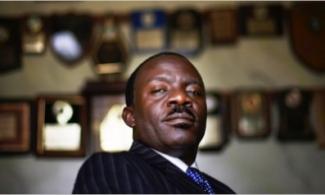
Lawyer and activist Femi Falana has indicated his support for President Goodluck Jonathan’s recent declaration of a state of emergency in Borno, Yobe and Adamawa States. In an interview with SaharaTV on Saturday, Mr. Falana explained his rationale for backing the decision.
Lawyer and activist Femi Falana has indicated his support for President Goodluck Jonathan’s recent declaration of a state of emergency in Borno, Yobe and Adamawa States. In an interview with SaharaTV on Saturday, Mr. Falana explained his rationale for backing the decision.
googletag.cmd.push(function() { googletag.display('content1'); });
Speaking from his home in Lagos, the activist lawyer stated that Mr. Jonathan had complied with the Nigerian constitution on declaration of emergency, adding that anybody who opposed the president’s action was not being serious about restoring normalcy in the areas of the country plagued by terrorist violence.
“The president is empowered to adopt extraordinary measures to restore law and order in the country whenever there is a breakdown in any section across the country. And that is what a state of emergency is all about,” said Mr. Falana.
The Nigerian government recently deployed more military troops to sections of Northern Nigeria as part of President Jonathan’s public address on May 14, focusing on the deteriorating situation in the three states where a state of emergency was declared. Portions of the three states are controlled by the Boko Haram sect, whose goal is to impose Islamic law in Nigeria.
In his nationwide broadcast, Mr. Jonathan acknowledged that violence and widespread destruction had overwhelmed Northern Nigeria. He also noted that his administration had attempted to combat the violence, but conceded that the insurgent’s systematic approach continued to thrive.
“We have taken robust steps to unravel and address the root causes of these crises, but it would appear that there is a systematic effort by insurgents and terrorists to destabilize the Nigerian state and test our collective resolve,” said President Jonathan in his state of emergency speech.
Mr. Falana asserted that the declaration actually came too late, adding that the situation had now become a national tragedy, not only in the north but for the entire country.
“It’s not a northern phenomenon, it’s a national calamity,” said Mr. Falana. “They have killed 4,000 people in the last three years. We’ve lost property worth over 2 trillion naira. They’ve set churches on fire. They’ve attacked people at the mosque, killing innocent people. They’ve bombed the UN building in Abuja. They’ve attacked the police headquarters. They’ve attacked military barracks and police stations,” added the lawyer, likening the situation to a state of war.
The current state of emergency in the north recalls the January 2012 state of emergency imposed in Borno, Yobe, Plateau and Niger States, which came shortly after the Christmas Day bombing attack at Saint Theresa's Catholic Church, near Abuja. That attack, believed to have been launched by Boko Haram, left more than 40 dead.
However, the 2012 state of emergency was lifted after six months, with several political figures questioning whether it served any purpose. One critic, Timothy Golu, the Chief Whip of the Plateau State House of Assembly, declared that security situation remained virtually the same as before the state of emergency.
“We thank the president for his deep and committed concern for Plateau State, but the state of emergency did not achieve what he earnestly sought for,” said Mr. Golu.
According to Falana, once the National Assembly approves the current state of emergency, the same regulations that existed during the 2012 state of emergency would be put into effect.
“If you go by the one declared last year, there were about eight regulations which included the movement of troops, restriction of movement, ban on public meetings and rallies,” said Mr. Falana.
A 24-hour curfew is currently in effect for Maiduguri, the capital of Borno State and one of Boko Haram’s strongholds. Some civilians in the town have reported seeing fighter jets in the air and hearing loud explosions from far, according to a report by Aljazeera.
The military’s often ambiguous role in fighting Boko Haram has for long been a concern for several human rights groups and activists that have accused the military of extrajudicial killings and wrongful arrests.
In response to that concern, Mr. Falana suggested that any person who participates in such crimes should be tried at the International Criminal Court (ICC) at the Hague.
“Anybody that is found liable in the situation that is going on will definitely be taken to the Hague [for] trial,” said Mr. Falana. He added, “That’s why we have warned the JTF operatives to watch out and to be very careful.”
In 2012, Mr. Falana had issued a statement accusing the Nigerian government of “crimes against humanity,” declaring that the government should be brought before the ICC.
Asked about the source of Nigeria’s crises, including Boko Harm, cults and poverty, Mr. Falana blamed corruption, lack of support for security personnel, and unemployment. On a long term solution, he said, “If you want law and order in the country you must provide for the majority of the people.”
googletag.cmd.push(function() { googletag.display('comments'); });
googletag.cmd.push(function() { googletag.display('content2'); });